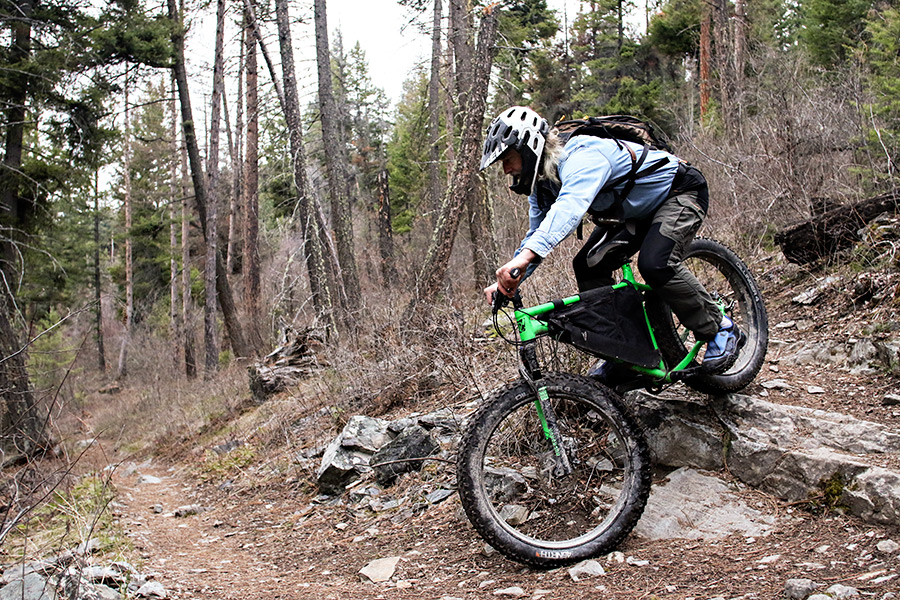Two Utah senators have introduced legislation that would allow federal officials, such as U.S. Forest Service supervisors, to decide whether mountain bikes could be used on sections of trail in designated wilderness areas.
U.S. Sens. Mike Lee, R-UT, and Orrin Hatch, R-UT, are proposing the Human-Powered Travel in Wilderness Act, a bill that would change the rule banning bikes in protected wilderness, such as the Bob Marshall Wilderness Complex.
The bill would allow local land managers to decide whether to permit mountain bikes in wilderness areas, for both recreational and management purposes, as well as allow federal employees or designees to use non-invasive, minimal technology to maintain wilderness trails.
“Our National Wilderness Preservation System was created so that the American people could enjoy the solitude and recreational opportunities of this continent’s priceless natural areas,” Lee stated after introducing the bill on July 13. “This bill would enrich Americans’ enjoyment of the outdoors by making it easier for them to mountain bike in wilderness areas.”
The debate over bikes in protected wilderness has intensified in the decades since 1984, when the Forest Service explicitly outlawed “mechanized transport” in those areas.
When asked for their initial opinion of the legislation, Montana’s congressional delegation expressed a range of views.
Democratic U.S. Sen. Jon Tester is opposed to the legislation.
“Jon does not support Senator Lee’s bill because it undermines a key conservation tool that protects some of Montana’s most beautiful places like the Bob Marshall,” Tester Press Secretary Dave Kuntz said. “On the management side, he finds it unnecessary because The Wilderness Act already allows land managers to use mechanized and wheeled tools as long as it is the minimum tool necessary to complete the job.”
Tester has come out in support of shoring up the Forest Service’s budget and has pushed for funding to maintain recreation trails throughout Montana. He has also sought changes in the funding structure for wildfire mitigation to free up resources for forest management.
Republican U.S. Sen. Steve Daines has similarly criticized the Forest Service for failing to prioritize trail maintenance in Montana.
Daines has not yet taken a stance on the Human-Powered Travel in Wilderness Act, according to staff.
There is not currently a version of the bill in the House, but according to staff with Republican U.S. Rep. Ryan Zinke, the Whitefish lawmaker, generally speaking, believes changes of some kind are necessary to allow the Forest Service to better maintain the trails.
As mountain biking grows in popularity across the nation, an increasing number of riders have lobbied for more access in wilderness areas. The Sustainable Trails Coalition, a mountain-biking group based in Colorado, helped author the bill, arguing that bikes have fewer environmental impacts than horses and other recreationists. The group says the original Wilderness Act of 1964 was written before mountain biking existed.
“These blanket bans on human-powered travel in wilderness are simply leftover relics from an era when mountain bikes were in their infancy and nobody knew what their impact would be, and the Forest Service overreacted and imposed a blanket ban on bikes without any basis in science,” STC board member Ted Stroll told the Denver Post. “These are ancient, fossilized rules that need reconsideration.”
Yet others believe the addition of bikes in the wilderness could disrupt valuable wilderness areas. Earlier this year, a group of 116 conservation organizations from across the U.S., including 13 from Montana, published a letter asking lawmakers to reject any proposed changes that would allow bikes in the wilderness.
“We see this for what it is – an assault on the very idea of Wilderness and the values of the Wilderness Act. Make no mistake, the goals of the Sustainable Trails Coalition are one of the biggest threats to the National Wilderness Preservation System,” stated George Nickas, executive director of Wilderness Watch. “At a time when wilderness and wildlife are under increasing pressures from increasing populations, growing mechanization, and a rapidly changing climate, the last thing Wilderness needs is to be invaded by mountain bikes and other machines.”
The Human-Powered Travel in Wilderness Act is awaiting review in the Senate Energy and Natural Resources Committee.
